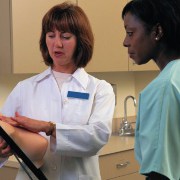 Photo: Getty Images
Photo: Getty Images
What is lobular carcinoma in situ? The name doesn't sound very reassuring. But lobular carcinoma in situ (LCIS) is not a cancer. Rather it should be viewed as more of a warning that you may be at high risk for breast cancer.
In lobular carcinoma in situ abnormal tissue forms in the lobules or milk glands of the breast. Hundreds of lobules, or milk glands are nestled in your breasts. LCIS can result when cells in a milk gland develop some type of genetic mutation.
LCIS happens when cells of a lobule's inner lining enlarge and replicate quickly. This can happen in one or both of your breasts.
Lobular carcinoma in situ will not usually be discovered in a mammogram. Examination of a biopsy of a breast lump or an abnormal mammogram involving, for instance microcalcifications, is the most common way that LCIS is discovered.
If you experience a change in your breast or breasts, like a lump, a puckered area, thickened skin or discharge from the nipple, see your doctor right away.
LCIS is usually found in women between 20 and 50 years of age. Women in their early 40s and who are premenopausal are the most likely to be diagnosed with LCIS, though it can also occur after menopause.
It is impossible to predict whether a case of lobular carcinoma in situ will ever become cancerous. But if you have been diagnosed with LCIS, it would be wise to participate in increased screening for breast cancer.
The risk of developing lobular carcinoma in situ is greater if you have a family history of breast cancer. If you have used hormone replacement therapy for menopause you are at greater risk.
It's important to note that of the women who develop LCIS, malignant breast cancer will occur in only about 25 percent of them.
Risk may be reduced by taking some action. Drinking alcohol should be limited or avoided. Exercising for half an hour most days, keeping a healthy weight, or losing any excess pounds slowly, can lower your risk.
Eat a healthy diet, cutting out sugar and refined foods, and increasing your fruits and vegetables. Get lots of rest and a good night's sleep.
Your doctor may deem it wise not to treat the condition, and may recommend instead that you come in for regular breast exams to monitor any possible changes.
If your doctor advocates early treatment, that may be a synthetic hormonal supplement to reduce activity of estrogen in your breasts. In extreme cases, surgical removal of the breast may be an option. Generally LCIS can be successfully treated with hormonal supplementation and surgery.
Resources:
BreastCancer.org: Non-invasive or Invasive Breast Cancer
http://www.breastcancer.org/symptoms/diagnosis/invasive.jsp
WiseGeek.com: What Is Lobular Carcinoma In Situ?
http://www.wisegeek.com/what-is-lobular-carcinoma-in-situ.htm
Cancer.org: What is breast cancer?
http://www.cancer.org/cancer/breastcancer/detailedguide/breast-cancer-what-is-breast-cancer
MayoClinic.com: Lobular carcinoma in situ (LCIS)
http://www.mayoclinic.com/health/lobular-carcinoma-in-situ/DS00982
Reviewed August 10, 2011
by Michele Blacksberg R.N.
Visit Jody's website and blog at http://www.ncubator.ca and http://ncubator.ca/blogger




Add a CommentComments
There are no comments yet. Be the first one and get the conversation started!